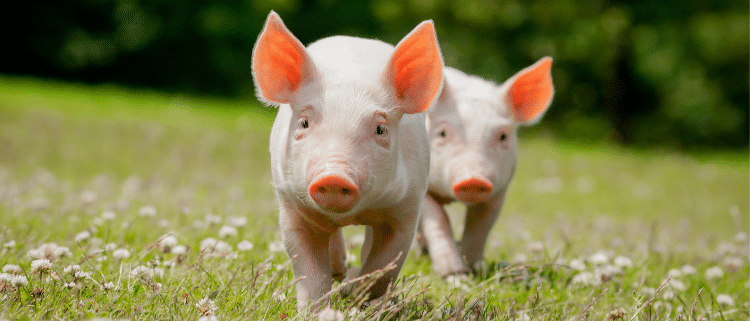Organic trace minerals in sows to reach genetic potential
Adequate supplementation with organic trace minerals in sow nutrition may help sows reach genetic potential .
Author: Mieke Zoon, Product Manager, Pancosma
Publication: Organic trace minerals may help sows to exploit their genetic potential, published in International Pig Topics, 2022
Modern sows are selected to have an increasing potential to produce piglets. However, big challenges arise with increasing litter size, as it has been shown to increase variability in piglet birth weights.
Piglets with a low birth weight have a lower growth performance until slaughter compared to medium and heavy weight piglets, especially linked to a worse feed conversion ratio. The reduced performance of piglets with a low birth weight has been linked to a competitive disadvantage for teats and less muscle fibres formed prenatally. Their start in life is often difficult due to low vitality, leading to increased pre-weaning mortality.
New nutritional standards required
Muscle fibre formation as well as general growth and development is very important in the last phase of gestation, which could be impaired when sows are not able to fulfill their nutritional requirements. Therefore, interest is raised to develop new management and nutritional standards for prolific sows.
The need to update nutritional requirements for these modern sows is well accepted. The first interest is on macro-nutrients like protein, energy, fibre and specific amino acids. The impact of trace minerals on general metabolism (antioxidant function, digestion, protein and energy metabolism) as well as fertility, immunity and bone and skin quality is already well known.
During the 1990s it was already shown that total trace mineral levels in sows were reducing during production and that this effect was stronger with increasing total weaning weights of their litters.
This means that sows are not able to replenish their trace mineral levels over reproduction cycles with standard mineral supplementation, and that requirements are increasing with prolificity. Increasing requirements would suggest increasing supplementation levels, however, there are several reasons not to recommend that strategy.
Firstly, negative interactions between minerals (competition for absorption and formation of undigestible complexes) are a reason to supply trace minerals not too far above their required levels.
Secondly, ‘less is more’ applies in many nutrients, as retention efficacy increases with decreasing availability to prevent deficiencies.
Finally, pressure from society through environmental organisations (on emissions into water and soil) and health advocates (on possible promotion of antibiotic-resistant bacteria with increasing zinc and copper in the soil) lead to increasingly strict regulation for trace minerals (for example, on maximum contents and application in the European Union). Therefore, the way forward to fulfil nutrient requirements of increasingly prolific sows is to select more bioavailable sources.
Glycine-based organic trace minerals
Organic trace minerals based on glycine, with proven chemical structure and product quality, have shown to be such a source of highly bioavailable trace minerals. A superior bioavailability of these so- called glycinates compared to traditionally supplemented inorganic sources in swine is shown consistently.
Sows supplemented with a reduced dose (50% from glycinates) showed to increase the average birth weight of piglets, by a significant reduction in piglets with a birth weight below 1.2kg.
At the same time, this reduced dose improved re-breeding of these sows, by significantly increasing insemination success. These results are fully in line with data from glycinates in other livestock species: increasing fertility and hatchability in broiler breeders and increased pregnancy rates in beef cows.
Additionally, the performance up to slaughter of piglets with the higher average birth weight was significantly better, showing improved daily gain, improved feed conversion ratio and higher lean meat on carcass compared to inorganic trace minerals.
A similar effect on improved growth performance and slaughter characteristics was seen in broiler chickens from broiler breeders supplemented with zinc-glycinate.
These coherent results across species can be explained by the essential functions of trace minerals which are non-specific to a single species. Supplementation with organic trace minerals does not mean providing a novel ingredient to your animals, it means providing an essential nutrient in a more efficient form. Updating nutritional requirements for modern sows to include organic trace minerals for greater efficiencies may support prolificity and performance.
Related articles



